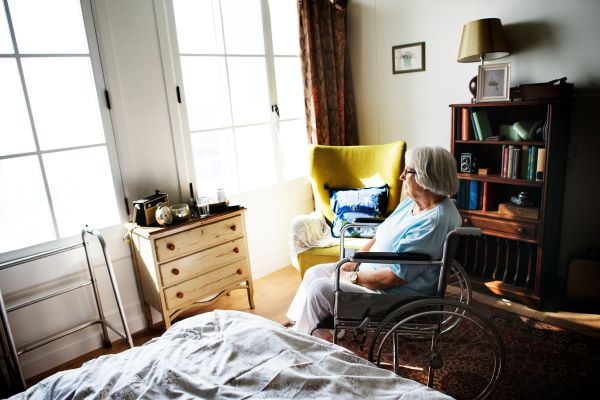To qualify for Medicaid, you must have limited income and assets (in most states, no more than $2,000 in your name). If you have more than that, you may find yourself having to "spend down" your extra assets to meet the $2,000 limit.

Residents of Nursing Homes Are Protected by the Policies of the Centers for Medicare and Medicaid Services
Nursing homes face a variety of public health challenges from infectious diseases like the flu and COVID-19. The Center for Medicare and Medicaid Services, CMS, outlines specific policies and protocols for residential health facilities. These measures outline policies related to visitations, nursing aid certification, and more. Nursing homes must comply with these policies to qualify for Medicare or Medicaid funds. The CMS goal is to ensure a minimum level of care for residents nationwide.
Nursing home residents are especially vulnerable to public health problems, such as infectious diseases. Their vulnerability comes from the inherent risks of congregate living and residents’ often fragile health, making strong public health policies especially important.
The Pandemic Health Emergency (PHE) from COVID-19 revealed a host of underlying problems in nursing homes across the United States. CMS guidelines changed to respond to the PHE and evolved again to reflect lessons learned from the PHE. While CMS regulates a minimal quality of care federally, states often supplement those policies.
State Legislation Goes Beyond Nursing Home Guidelines
A review of state legislatures finds twenty-three politically and geographically diverse states passed more than seventy new provisions affecting the operations of nursing homes. The laws cover a wide range of issues to benefit nursing home residents.
Connecticut law now permits its nursing home residents to designate an “essential support person” who can care for a loved one even during a public health emergency. In March 2021, the Alabama legislature enacted the “No Patient Left Alone Act.” Like Connecticut’s law, it ensures that residents have an advocate by their side, not merely a visitor stopping in for a quick hello.
Other states are ramping up efforts to provide tablets and other devices through lending libraries. Residents can borrow devices to communicate with their families and loved ones. Digital contact becomes necessary for some nursing home residents with families spread across the country and unable to visit frequently. These digital communications also help loved ones make appropriate care decisions and advocate for the resident’s needs.
Illinois reduced the cost of providing this equipment through grants via state funds received when health and safety violations of nursing homes reach a financial settlement.
Staffing levels are another issue the states are tackling. Addressing staffing shortages is a long-time response to a 1987 federal law requiring CMS facilities to maintain nursing staff sufficient to “attain or maintain the highest practicable well-being of each resident.” The vagueness of this law led several states to add more specific staffing requirements.
The office of the Attorney General of New York State in the Nursing Home Response to COVID-19 Pandemic report findings show lower COVID-related death rates in nursing homes with higher staffing levels. Arkansas Advocates for Nursing Home Residents Martha Deaver concurs that the standard of care decreases with less staff.
States are also ensuring facilities are not receiving excessive profits from government payouts to care for residents. New Jersey requires nursing homes to spend ninety percent of their revenues on direct care. New York deems the number to be seventy percent, including 40 percent to pay direct-care workers. Massachusetts regulations mandate nursing homes devote seventy-five percent to direct-care staffing costs and have no more than two people living in one room.
These states’ patchwork protections for nursing home residents are part of the nation’s nursing home care regulatory system. CMS sets the minimum requirements providers must meet in their facilities to participate in the Medicare/Medicaid programs at the federal level. It is permissible for states to implement specific additional requirements as long as they do not conflict with existing federal requirements.
Inequalities Among States for Residential Facilities
Because each state can implement additional nursing home regulatory improvements, there are uneven nursing home care provisions throughout the country. These differences may exacerbate healthcare disparities of financial status, race, or gender. Richard Mollot, executive director for the Long Term Care Community Coalition advocacy group, finds this hodgepodge approach “a poor substitute for comprehensive federal rules if they were rigorously enforced.” If you or a loved one is a nursing home resident, you should know the additional measures your state provides. Depending on how your state supplements the CMS minimum standards of care, you may need to do research that your chosen facility goes above and beyond the minimum requirements.
We hope you found this article helpful. If you’d like to discuss your particular situation, please don’t hesitate to reach out. Please contact our Cincinnati office by calling us at 513-771-2444 and schedule a consultation.



